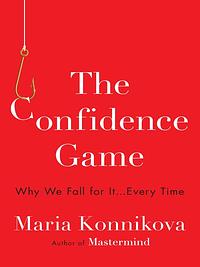Take a photo of a barcode or cover
A very solid read, although I couldn't help but feel like it was lacking something. Maybe I would have liked a more in-depth retelling of some of the scams, or a more "personal" touch to each of the stories. Either way a really interesting book, 3.5
informative
medium-paced
Very long read for a not a lot of actual content. Every chapter felt like a repeat of the last. There were some interesting stories about cons and many mentions of psychological research that was fun to read but each bit was so short, not enough for a deep dive and too repetitive to keep it interesting
3.5 stars rounded up to 4.
I read this after watching 'The Tinder Swindler' and listening to the 'Sweet Bobby' podcast as I wanted to learn more about how and why con-people have such success, and that I did! However, while there were some really insightful parts to the book, specifically the chapters 'The Put Up' and 'The Play', I agree with other reviewers that it need not have been so long. It kind of lost its way towards the end and the structure went a bit awry. I appreciated the clear writing style, though, as I can't imagine it was the easiest task knowing when to best draw on certain examples.
I read this after watching 'The Tinder Swindler' and listening to the 'Sweet Bobby' podcast as I wanted to learn more about how and why con-people have such success, and that I did! However, while there were some really insightful parts to the book, specifically the chapters 'The Put Up' and 'The Play', I agree with other reviewers that it need not have been so long. It kind of lost its way towards the end and the structure went a bit awry. I appreciated the clear writing style, though, as I can't imagine it was the easiest task knowing when to best draw on certain examples.
There is a lot of nonfiction in this vein that could ultimately be a longform article or blog post and still convey key points. Identifying common threads among con artists and the scams they run is an encouraging topic. 352 pages of it? Too long. This topic calls for a brisk, tight edit. To make matters worse, it read like someone composing Wikipedia summaries instead of writing from inherent knowledge of the topic.
informative
reflective
medium-paced
(3.5) An interesting dive into the psychology of how con artists set us up and why we fall for their cons.
Una obra absolutamente estupenda que mezcla a la perfección historias de estafadores y de la estafa, con los principios psicológicos subyacentes, y un estilo de narración absolutamente magistral. Me ha encantado.
El libro se estructura en torno a los pasos que da una estafa, de modo que los efectos psicológicos implicados quedan más claramente resaltados, y ejemplificados. De este modo es fácil seguir el desarrollo de una estafa que, como toda forma de persuasión, se ayuda de un principio base: que creemos lo que queremos creer, y el estafador no hace sino explotarlo.
Ha sido una gran idea incluirlo como bibliografía en el libro que estoy escribiendo. No puedo recomendarlo más.
El libro se estructura en torno a los pasos que da una estafa, de modo que los efectos psicológicos implicados quedan más claramente resaltados, y ejemplificados. De este modo es fácil seguir el desarrollo de una estafa que, como toda forma de persuasión, se ayuda de un principio base: que creemos lo que queremos creer, y el estafador no hace sino explotarlo.
Ha sido una gran idea incluirlo como bibliografía en el libro que estoy escribiendo. No puedo recomendarlo más.
Really interesting perspectives with lots of anecdotes to support the psychology behind cons.
In the vein of Malcolm gladwell or Hidden Brain. Science lite with a psychology bent. Easy to digest and interesting but could’ve been a long form magazine article rather than a book. I’ve really been into docs about cons (dropout, tinder swindler, inventing Anna, dirty john) so it was a little enlightening and interesting to read a psych based perspective on it.



